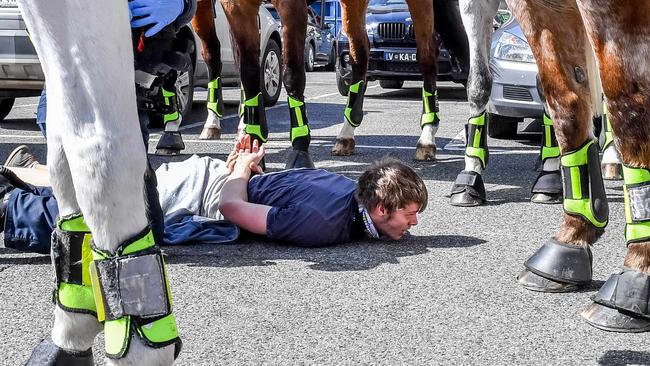Dan’s COVID Omnibus detention law explained
It’s the law that would allow “authorised officers” to arrest anyone they think may not comply with lockdown restrictions, and it’s sparked outrage across Victoria. So when will it become law and why does Daniel Andrews want it?

Coronavirus
Don't miss out on the headlines from Coronavirus. Followed categories will be added to My News.
WHAT IS IT?
The COVID-19 Omnibus (Emergency Measures) and Other Acts Amendment Bill 2020 extends a range of temporary changes made by the previous Omnibus Bill, introduced in April, for another six months. The original Bill was introduced for the purpose of responding to the COVID-19 pandemic. This bill extends those measures, but also adds a raft of new measures.
WHY IS IT CALLED OMNIBUS?
An omnibus bill typically covers a wide range of diverse and unrelated topics. The word Omnibus, derived from Latin, means “to, for, by, with or from everything”. The bill packages several measures to be considered by parliament in a single vote.

IS IT LAW YET?
No. The bill has passed the parliament’s lower house, but that is no surprise, the government hold a substantial majority so that was never in doubt. However it must not pass the scrutiny of the upper house where things are much less clear cut and the government will rely on support of the crossbench. Already key crossbenchers have flagged rejecting the bill without significant amendment.
WHY ARE LAWYERS WORRIED ABOUT IT?
The key concern about the bill is the power it would give to authorised officers to determine that a person is a serious risk to public health and should therefore be detained.
There would be no requirement that persons authorised be police officers, or even public servants.
In fact the bill explicitly broadens the categories of people who can become authorised officers, allowing the Secretary of the Department of Health and Human Services to appoint anyone deemed to possess appropriate skills, attributes or experience.
Emergency powers already allow authorised officers under the Public Health and Wellbeing Act 2008 (Vic) to detain people and to restrict movement.
But the Omnibus Bill would expand those powers and allow officers to detain any person they believe is likely to fail to comply with an emergency direction and is a close contact of a person diagnosed with COVID-19.
This detention could last as long as the authorised officer reasonably believes the person in detention is likely to fail to comply with an emergency direction.
An open letter by a group of prominent jurists has argued that “authorising citizens to detain their fellow citizens on the basis of a belief that the detained person is unlikely to comply with emergency directions by the “authorised” citizens is unprecedented, excessive and open to abuse.”
WHY DOES THE GOVERNMENT WANT THE LEGISLATION?
Daniel Andrews says the bill is essential to keeping COVID-19 numbers low.
The Premier said it was necessary to boost the number of authorised officers available.
“If you’re going to have COVID-safe plans enforced, if you’re going to have people doing the right thing, so that we jealously guard the low numbers we are in the process of actually delivering, then you need to have a bigger enforcement team.”
Mr Andrews has disputed claims that parts of it were open to abuse but agreed the scope of the bill was unprecedented.
“It is (unprecedented), because we’re in a one-in-100 year event,” he said on Tuesday.
WHAT’S IN IT?
Beyond the controversial measures, the bill also temporarily extends changes allowing the ongoing operation of essential public services during the coronavirus pandemic, including the running of the courts and local government through the use of audiovisual technologies, as well as extending other essential supports, such as support payments for people with long-term workplace injuries unable to return to work due to the pandemic.
The bill also makes new changes to ensure people’s safety at home and work, including strengthening the occupational health and safety powers of workplace inspectors to ensure that they reduce the risk of COVID transition and providing greater powers to registrars in the Magistrates and Children’s courts to be able to change the date, time or place at which court proceedings are listed and allowing them to prioritise urgent family violence and personal intervention matters.
It also allows planning permits and panel hearings to be carried out electronically and for teacher and training organisation renewals to be done online.
These measures will be in place for six months to 26 April 2021.
READ MORE
